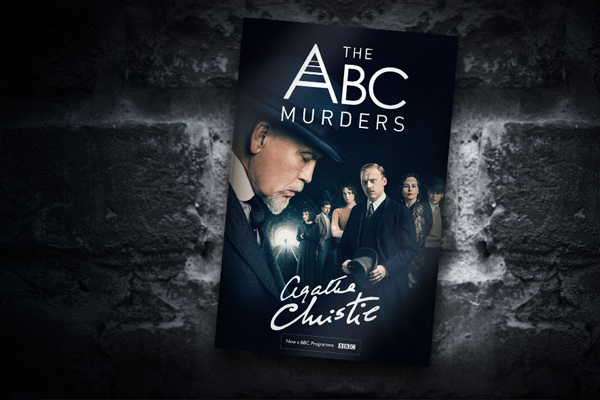
The ABC Murders: An Extract
In this extract from the novel, Hercule Poirot has received a mysterious letter from A B C., but the police cannot see any relevancy in the letter, which warns of an incident in Andover on the 21st of the month.

Taken from Chapter 3, Andover
Poirot looked at me sadly.
‘You have made there a very pretty résumé of nearly all
the detective stories that have ever been written.’
‘Well,’ I said. ‘What would you order?’
Poirot closed his eyes and leaned back in his chair. His
voice came purringly from between his lips.
‘A very simple crime. A crime with no complications.
A crime of quiet domestic life…very unimpassioned—very
intime.’
‘How can a crime be intime?’
‘Supposing,’ murmured Poirot, ‘that four people sit down
to play bridge and one, the odd man out, sits in a chair by
the fire. At the end of the evening the man by the fire is
found dead. One of the four, while he is dummy, has gone
over and killed him, and intent on the play of the hand, the
other three have not noticed. Ah, there would be a crime
for you! Which of the four was it?’
‘Well,’ I said. ‘I can’t see any excitement in that!’
Poirot threw me a glance of reproof.
‘No, because there are no curiously twisted daggers, no
blackmail, no emerald that is the stolen eye of a god, no
untraceable Eastern poisons. You have the melodramatic
soul, Hastings. You would like, not one murder, but a
series of murders.’
‘I admit,’ I said, ‘that a second murder in a book often
cheers things up. If the murder happens in the first chapter,
and you have to follow up everybody’s alibi until the last
page but one—well, it does get a bit tedious.’
The telephone rang and Poirot rose to answer.
‘’Allo,’ he said. ‘’Allo. Yes, it is Hercule Poirot speaking.’
He listened for a minute or two and then I saw his face
change.
His own side of the conversation was short and disjointed.
‘Mais oui…’
‘Yes, of course…’
‘But yes, we will come…’
‘Naturally…’
‘It may be as you say…’
‘Yes, I will bring it. A tout à l’heure then.’
He replaced the receiver and came across the room to me.
‘That was Japp speaking, Hastings.’
‘Yes?’
‘He had just got back to the Yard. There was a message
from Andover…’
‘Andover?’ I cried excitedly.
Poirot said slowly:
‘An old woman of the name of Ascher who keeps a little
tobacco and newspaper shop has been found murdered.’
I think I felt ever so slightly damped. My interest, quickened
by the sound of Andover, suffered a faint check. I had
expected something fantastic—out of the way! The murder
of an old woman who kept a little tobacco shop seemed,
somehow, sordid and uninteresting.
Poirot continued in the same slow, grave voice:
‘The Andover police believe they can put their hand on
the man who did it—’
I felt a second throb of disappointment.
‘It seems the woman was on bad terms with her husband.
He drinks and is by way of being rather a nasty customer.
He’s threatened to take her life more than once.
‘Nevertheless,’ continued Poirot, ‘in view of what has
happened, the police there would like to have another look
at the anonymous letter I received. I have said that you and
I will go down to Andover at once.’
My spirits revived a little. After all, sordid as this crime
seemed to be, it was a crime, and it was a long time since
I had had any association with crime and criminals.
I hardly listened to the next words Poirot said. But they
were to come back to me with significance later.
‘This is the beginning,’ said Hercule Poirot.


 UK
UK 